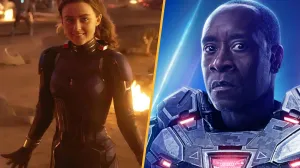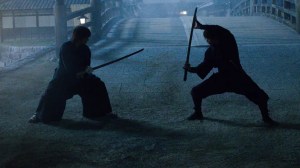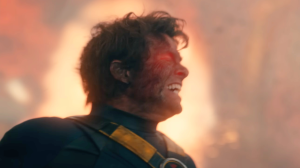On Monday, the news that fans of The CW’s The Flash had been both expecting and dreading became official. The long-running DC Comics inspired series — and technically the last of the network’s so-called Arrowverse — will end with a 13-episode ninth season in 2023. The announcement marks the end of an era, one that dramatically changed the face of superhero television and while there are many fans who are hoping that the Arrowverse can continue after The Flash‘s end, be it with spinoffs or through the resurrection of other, previously cancelled in-universe shows by other networks, the reality is now is the right time to end the Arrowverse.
Videos by ComicBook.com
When The Flash first debuted in 2014, it wasn’t the first DC series on The CW. That distinction belongs to Arrow, which debuted in 2012 and indeed gave The Flash its start in a sense, with Grant Gustin appearing as Barry Allen on Arrow, but while Arrow was first, The Flash quickly became one of the network’s most-watched series. As the series continued, The Flash very much became the heart of the newly minted Arrowverse. At times, it felt like Team Flash and Central City were something of a hub for the Arrowverse with Barry having relationships with nearly all the other heroes and indeed being the connection to heroes from other realities — first Supergirl and, later, Black Lightning. Now that the rest of the shows and their heroes are gone, it’s only fitting that The Flash be the series to turn off the lights as it were.
The time is right from a story perspective as well. Ever since “Crisis on Infinite Earths”, The Flash has been a very different series. Having been through the death and rebirth of the universe, Barry Allen is a much more mature hero and while recent seasons have seen very personal stories and challenges for him, they’ve also very much seen an expansion of the idea of what being The Flash is. Love it or hate it, heroes never operate in a vacuum. Even on the pages of comics the heroes frequently must rely on others in some fashion and The Flash has taken that to heart with Team Flash growing and, bit by bit, new heroes rising to take more responsibility. Heading into Season 9, Barry is no longer Central City’s lone protector and he’s now in a place where he is taking more of a supervisory role. The world doesn’t need “The Flash” anymore. It has so much more.
On a smaller scale, The Flash as a series has also largely wrapped up its major, series-long conflict as well. The Season 8 finale saw Barry finally defeat Eobard Thawne/Reverse Flash (Tom Cavanagh) once and for all. While there are certainly still stories that can be told — and will be in Season 9 — at the center of The Flash has always been the Barry/Thawne of it all. Barry “levelled up” this season and won that fight. Closing the book here feels complete and it seems like that’s something even showrunner Eric Wallace felt in terms of that particular story arc in Season 8. He told ComicBook.com after the finale that they initially thought the Season 8 finale would be the series finale, which prompted that epic battle.
“Well, there’s two things. One, this time Thawne did cross the line. He actually killed Iris in bringing about his resurrection,” Wallace told us about what made this story the one for a final showdown. “When that happened, I knew story-wise that emotionally, it would push Barry Allen to a place where he’d never been before. A place where for the first time, he really is actually about to cross the line and consider killing someone. Because he’s not reacting as our heroic Flash as we know him, he’s reacting as a spouse and as a partner, he’s reacting emotionally. I. knew this would be the one time where we could have a story… and how appropriate that it should be in a season finale, but one time we’ve got a story about a hero actually about to kill his arch nemesis. So, that was pretty terrific.”
He continued, “Having said that, there’s the other side which was, when we were writing this script and breaking the story, we thought this was the series finale, not the season finale. We thought this was the end. So, we’re like, ‘All right, well, we’ve got to have the final battle against the Reverse Flash, and he’s got to die. We’ve got to push it as far as we can dramatically and tell the most epic story possible and present the most emotional battle that we can.’ Then of course, right as we finish the script, we got the wonderful news that we would be getting a ninth season, which I’m very happy about.”
Outside of overall network universe and story reasons, there are other arguments to be made for why now is a good time for the Arrowverse to end. Structurally, interconnected crossovers are just no longer practical for the Arrowverse due to ended shows and other logistical issues. The superhero entertainment landscape in 2022 is very different than it was in 2014. Now, fans have Marvel’s Disney+ series to enjoy as well as a few other DC offerings as well — Titans and Doom Patrol on HBO Max, DC’s Stargirl and Superman & Lois on The CW — and even the Arrowverse is finding other ways to continue its stories on the pages of comics. Any one reason along would be strong, but taking all of them into consideration, one final season of The Flash seems like a solid way to tie everything up in a bow, a final 13-episodes to honor the unique and groundbreaking experience that was the Arrowverse and look ahead to whatever is next. It may be bittersweet, but now really is the right time to end the Arrowverse.
The Flash will return for its ninth and final season in 2023.








